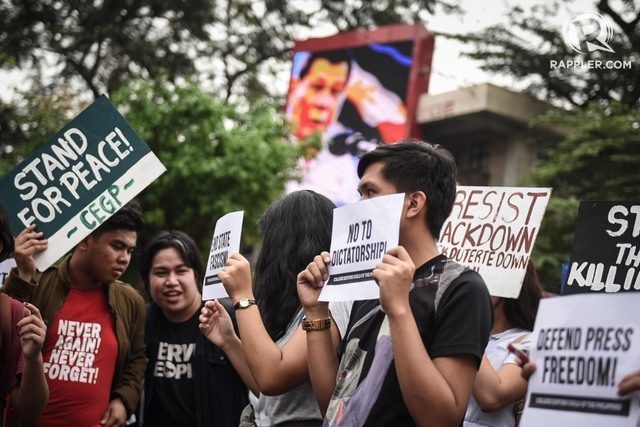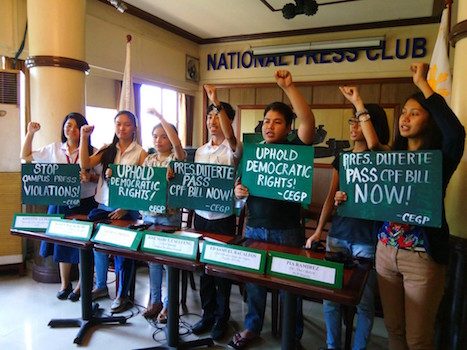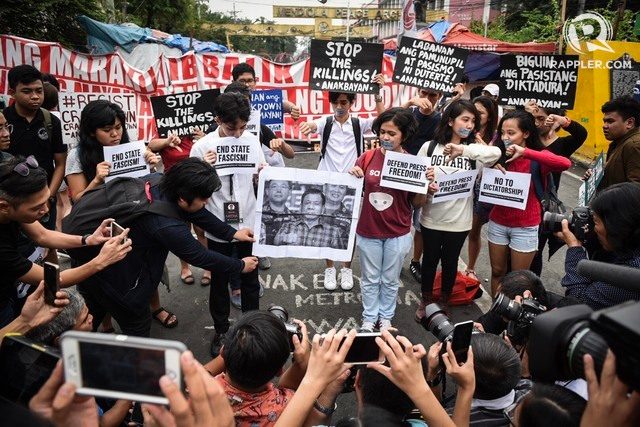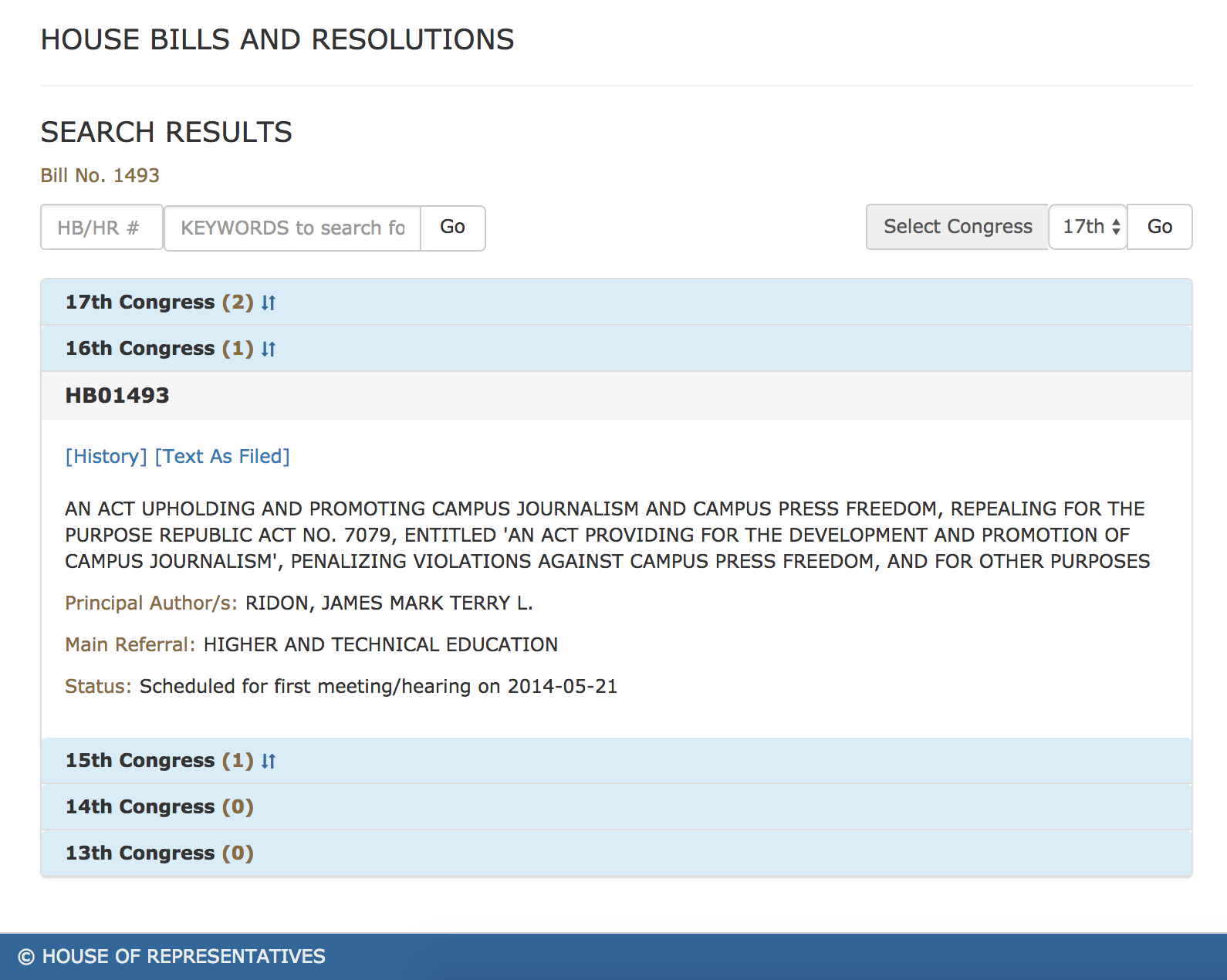SUMMARY
This is AI generated summarization, which may have errors. For context, always refer to the full article.

MANILA, Philippines – The Campus Journalism Act (CJA) approved by the late former president Corazon Aquino on July 5, 1991 was enacted in recognition of the vital role the campus press played during Martial Law.
According to Luis Teodoro, former dean of the University of the Philippines College of Mass Communication, Republic Act (RA) 7079 recognized the campus press. According to his book, “Mass Media Laws and Regulations in the Philippines,” the law declares it is the “policy of the State to uphold and protect the freedom of the press even at the campus level.”
Though the law made it the government’s duty to protect the freedom of student journalists, press freedom advocates argue that the CJA has flaws that compromise press freedom such as the lack of stable funding and lack of material provisions on editorial independence. (READ: Oldest alliance of college editors urges PH media to unite for press freedom)
How effective has the act been in safeguarding press freedom?
Editorial Independence
Ensuring editorial independence under the Campus Journalism Act has proven to be a challenge for student journalists.
Section 7 of the bill provides for the security of a student’s attendance in school, and says, “A student shall not be expelled or suspended solely on the basis of the articles he or she has written, or on the basis of the performance of his or her duties in the student publication.”
But a 2000 Supreme Court Ruling set a caveat to the provision and said a reading of the section should not infringe on the school’s right to discipline its students. It reads:
Consistent with jurisprudence, we read Section 7 of the Campus Journalism Act to mean that the school cannot suspend or expel a student solely on the basis of the articles he or she has written, except when such articles materially disrupt class work or involve substantial disorder or invasion of the rights of others.
In addition to this, the College Editors Guild of the Philippines has reported that several members of student publications were also included in a “watchlist” of the Armed Forces of the Philippines for their critical reporting.
The editorial independence of student publications is also being challenged through funding.
According to Danilo Arao, a journalism professor at the University of the Philippines, press freedom is burdened by issues of funding. Critics of the law argue this is a point of weakness as school administrations – or in the case of state-funded schools, the government – can exert pressure on campus publications by withholding funds.
“Even if it explicitly guarantees campus press freedom, the CJA is inherently oppressive because there is no mandatory collection of student fees…Just like Congress, school officials use the ‘power of the purse’ to silence the critical campus press,” he said.
While the law provides for the funding of student publications, it has made doing so optional for school administrations. In providing financial assistance, the CJA states funding “may include the savings of the respective schools’ appropriations” as well as subscriptions and other funds.
“I think this [was] a way to kill student publications as early as that time,” Arao said.
Public schools also face difficulties when it comes to printing costs and other financial transactions, which Arao explained, are subjected to the usual bureaucratic procedures. In some cases, this can make it difficult for campus publications to put out an issue regularly.
But despite these issues, student journalists can still make use of the bill’s declaration of principles to safeguard their rights as student journalists.
“While there are weaknesses in the CJA, its declaration of principles could still be used to assert the importance of campus press freedom,” Arao said.

Conflicting components?
While RA 7079 defined key components of the bill, it left conflicting elements in several of its provisions.
Key components of the bill are defined as such:
Student publications – The act defines student publications as any printed material independently published by students.
It should also meet the interest and needs of students through editorial board and staff composed of students who are selected through “fair and competitive examinations.”
The law also provides that once the editorial board is established, it “shall freely determine its editorial policies.” It would also be responsible for managing publication funds.

Editorial policies – According to RA 7079, editorial policies are the guidelines a student publication follows for its management and operations.
According to the law, policies should take into account pertinent laws as well as existing school policies. It should also determine the frequency of publication, process for selection of stories, and similar matters.
The opportunity for students to “freely determine” editorial policies, would enlist the need of an editorial board.
Editorial Board – A student publication’s editorial board is composed of student journalists who have qualified in placement examinations.
At the elementary and high school levels, however, the board is not composed of students only. It would include an appointed faculty adviser, the student editor, and a representative of the parent-teacher association. Together, they determine editorial policies to be implemented by the editor and staff of the student publication.
It is only at the college level where appointing a publication adviser is optional. In the event that an adviser is present, his or her role would be limited to that of “technical guidance”.
But what exactly does “technical guidance” mean?
According to Arao, technical guidance from an editorial standpoint refers to “nuances in media production like checking the grammar of articles and ensuring adherence to professional standards when it comes to the design and lay-out of the pages.”
However, the CJA does not define this. According to Arao, this has led to some cases where administrators and faculty advisers define it based on their own “understanding or misunderstanding of the journalism profession.”
He added, “Clearly, doing so had compromised the editorial independence of student publications.”
Proposed Campus Press Freedom Act
Currently, there is a bill in the House of Representatives that seeks to remedy some of these flaws.
House Bill (HB) 1493, introduced in the 16th Congres by former Kabataan Party-List Representative Terry Ridon, included in its proposal the following:
- Mandatory funding of student publications
- Optional appointment of a publication adviser at all levels
- A working definition of “technical guidance”, should students choose to appoint an adviser
- Provisions on the security of students’ tenure
- The power for the Commission on Higher Education (CHED), Technical Education and Skills Development Authority (TESDA), and the Department of Education (DepEd) to investigate violations of campus press freedom and impose necessary sanctions
- Provide student journalists with legal assistance when needed
The Campus Press Freedom Act also makes it mandatory for all schools to establish at least one student publication.
The proposed law seeks to repeal RA 7079 and says, “While it has some strong provisions, the seriously flawed Campus Journalism Act has been found to be insufficient and lacking in material aspects to fully maintain the existence of the campus press.”
It added, “In the hands of devious school administrators, the Campus Journalism Act places in jeopardy the existence of campus publications nationwide.”
According to Arao, RA 7079 needs to be repealed as “this has been used as a mechanism to stifle campus press freedom since the 1990s.” (READ: Campus journalists say press freedom is everyone’s battle)

But the likelihood the bill would be passed anytime soon seems far-fetched. A search on the status of the proposed law showed that HB 1493 was only on its first reading, despite being introduced in 2013.
“Apparently, the majority of the members of Congress pay little or no attention to the cause of campus press freedom,” Arao said. – Rappler.com
Add a comment
How does this make you feel?
There are no comments yet. Add your comment to start the conversation.